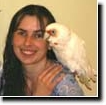What do your birds NEED?
Kristen Reeves, Meadowlark Farms Avian Supply, Inc.
The bulk of the questions directed to my email contain those regarding nutrition. Most are asking me what exactly it is that our birds need to remain happy, healthy, and prolific, and whether or not they REALLY need these things. So with that said, I've written a simple list that should help clarify a few things. Of course each species may have slightly different requirements – more or less of certain supplements, species specific seed mixes or nectar, and/or live food to successfully raise their young, so it is very important that you research all aspects of your particular species to better acquaint yourself with their needs. This list is just the basics. You may need additional items depending on the species you keep.
Get the nutrition right and you will see very few issues with your birds.
Good nutrition is paramount to keeping your birds healthy. Healthy birds produce healthy chicks. Excellent nutrition helps to strengthen the immune system. The stronger your adults, the stronger their chicks will be. You will only get what you put into your birds. If you skimp on their nutrition, you'll end up with birds who are weak immunologically, and eventually, genetically. This is fact. It is not debatable!
SEED:
A good, QUALITY seed mix created for the SPECIES you are keeping. Not every bird eats a standard finch mix or a standard canary mix. Research the type of seed your species should eat. Personally, I prefer not to waste my money on the pre-packaged pet store seeds that contain all those pretty colored bits that are supposed to be vitamins. Why? Because MY birds won't eat those colored bits, AND I prefer to know for a fact they are getting everything they need. If they won't eat them, I'm wasting my money. Therefore, I supplement them myself.
SUPPLEMENTS:
Regardless of what BRAND of supplements you use, it is important you choose ONE BRAND and STICK WITH IT! I personally use and prefer the Dr. Rob Marshall supplements, but you need to find what works for you and YOUR birds. However, unless you are an avian nutritionist and know exactly what items will and will not make complete nutrition, it is important you do NOT mix brands. Manufacturers create their supplements to work as a system. Mixing or combining supplements from different manufacturers can throw off the fine balance of that system - potentially causing hypervitaminosis or even malnutrition.
Each supplement will have different directions and dosages and may be designed to be used during a certain part of a bird’s annual cycle, again, depending on manufacturer. ALWAYS read and follow the directions. Do exactly as they say. More is NOT always better, and less is not enough!
CONSISTENCY is key. If this week you give them vitamins but next week you don't, your birds will be lacking. There is no such thing as “instant gratification” when keeping birds. You will gain healthy birds without outstanding plumage only through good nutrition and husbandry. If you aren’t consistent, the birds will not become what they could or should be.
Your captive birds NEED the following –
1. A good multi-vitamin supplement
2. Calcium with vitamin D3
3. Iodine – amounts will vary by species
4. Grit - both soluble and insoluble – finches don’t have teeth. They need grit to help their gizzard grind the seed they hull then swallow whole.
WATER:
Whether you add supplements to the water or on the seed, it is important that your birds have FRESH water DAILY. I know many folks like to put up a large drinker and only change it when it is empty, but if you could see what is in the lip of that drinker or cup at the end of the day, you'd think twice about that practice! That water may contain supplements, but the drinkers should be replaced DAILY, which means even if you offer the same supplement two days in a row, you should offer it to the birds fresh daily. You wouldn't drink out of your toilet, why should your birds? You would be amazed at what I find in the drinkers after only a day. Microscopic ickies abound! Many issues can be avoided simply by changing the water daily.
TREATS, SOFT FOOD, GREENS, ETC:
As with anything - treats in moderation are okay as long as they are offered no more than once or maybe twice per week. Treats are often fattening and can lead to picky birds who will eat only the foods they like, and not the foods they need. In addition, a fat bird will not breed well and may have feather issues. Fattening foods can cause obesity which can then lead to fatty liver disease and a host of other health issues. A fat bird is more susceptible to disease than one that has been kept trim through diet and exercise.
Soft foods too can be fattening. If the birds are molting or breeding, they will benefit from that extra fat and protein, but if they are resting, these should be limited.
Birds in captivity who are not housed outdoors are not accustomed to fresh greens or fruits. Most species we now keep in captivity have been here long enough that giving greens or fruits in large quantities can cause diarrhea. Should you decide to offer fresh greens, you should use only carefully rinsed, dark green leafy vegetables that hold the most nutrients. Iceberg lettuce is useless; don't even bother! Brassicaceaes (foods that belong to the cabbage family) such as cabbage, broccoli, cauliflower, turnip, rapeseed, mustard, radish, horseradish, cress, wasabi, and watercress, can INHIBIT calcium absorption, and while full of nutrients, should be limited to no more than twice per week.
Remember too that if you need to supplement or medicate your birds, they will go for the "wet" foods such as greens, sprouts, chitted seed, or soft food FIRST to get the moisture from them. You should remove any wet items any time you need to medicate or on days you are supplementing their diet through their drinking water. You should also check the medication to see if it states to remove “grit” or “minerals” as some will chelate with the medication causing more serious issues.
Again, it is extremely important that your bird's nutrition is optimal and they are receiving everything they need. Ensuring they get what they need will help keep them happy, healthy and prolific.





